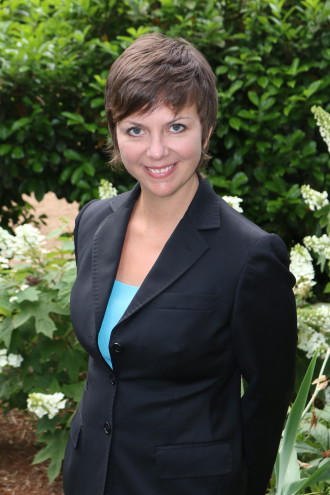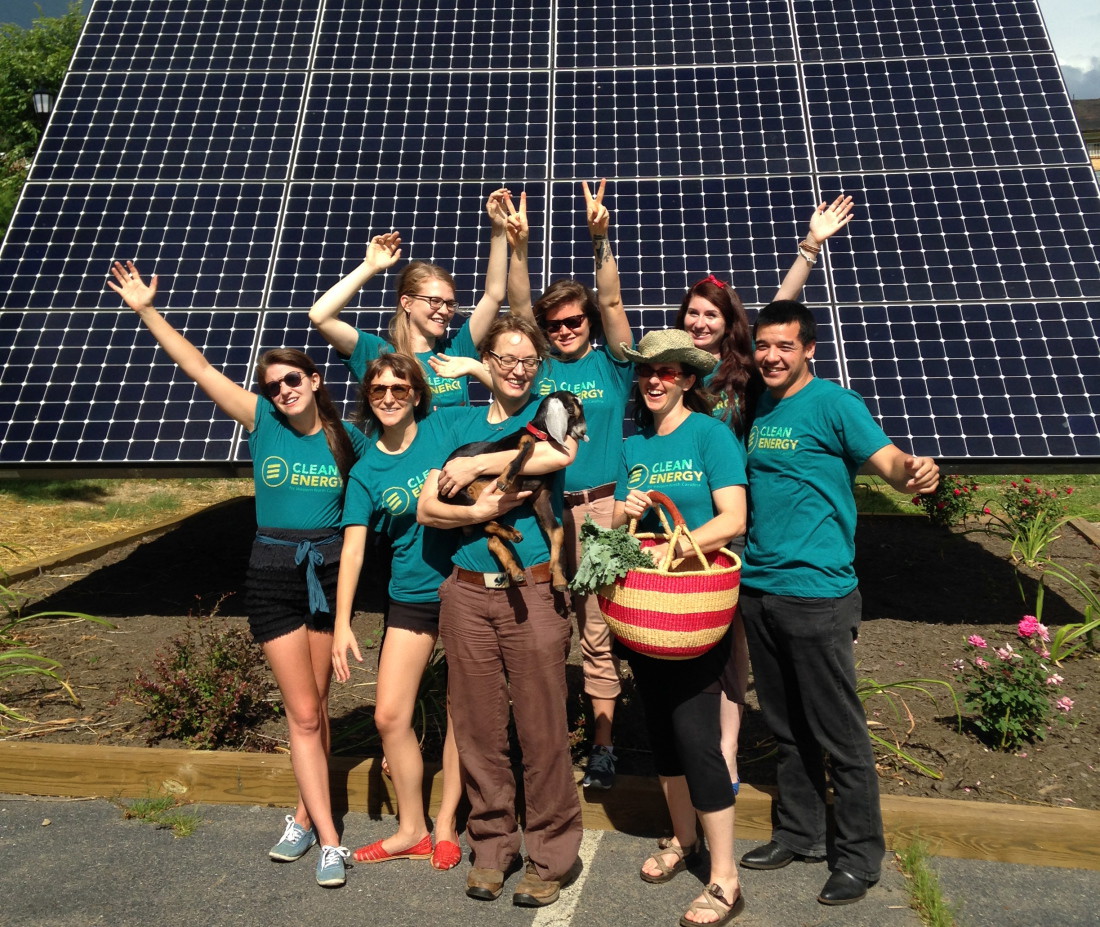Katie Bray’s fascination with solar technology came at a very early age. Growing up in the Sawtooth Mountains of Idaho, she loved taking apart solar calculators and using the cells to power remote-controlled toy cars.
As an adult, she studied renewable energy and environmental economics before moving to Asheville to work for the Blue Ridge Sustainability Institute. Inspired by an initiative that was happening on the West Cost, she launched a program through BRS and the city of Asheville that connected solar installers with residential homeowners for group purchasing of solar panels, and soon found herself at the front of the state’s solar revolution.
“Before that program, there were very few solar projects in North Carolina,” Bray recalls of the 2013 project known as Solarize Asheville. “So, to all of a sudden install 52 solar installations, which was more than had cumulatively been installed in the history of our state, was a big deal.”

Legislative action in the state was also paving the way for solar to advance. In August 2007, North Carolina became the first Southeastern state to adopt a Renewable Energy and Energy Efficiency Portfolio Standard. The law required investor-owned utilities to supply 12.5 percent of their electricity sales through renewable energy sources by 2021 and 10 percent by 2018.
For Zoe Hanes, the regulations presented a major career opportunity. Hanes had studied energy law at Vermont Law School before moving to North Carolina where her work focused on affordable housing tax credits.
“When the Renewable Energy Portfolio Standard passed, I was somebody who had enough knowledge about energy law and a lot of knowledge about tax equity,” Hanes says. “There weren’t many people in this state willing to serve the solar industry because it was very nascent.”
Hanes formed a renewable energy practice at her firm in Winston-Salem, served on the board of the League of Conservation Voters and worked nearly 800 pro bono hours for renewable energy startups, all while still in her 20s. At eight months pregnant, she came to work at FLS Energy as vice president and general counsel, the $147.3 million utility-scale solar company based in Asheville.
Hanes credits a long history of working women role models with propelling her career: Her grandmother raised three children as a young widow; her mother was a single, working parent; and Hanes worked her way through community college, undergraduate studies and law school by painting houses. It was an experience that taught her not to be afraid of risks — like abandoning a partnership-track career to make the jump into the fledgling solar industry.
Solar’s gender gap
As successful women in solar, Hanes and Bray are very much in a minority. Despite being one of the fastest growing industries in the country, solar isn’t a very diverse field. The nonprofit Solar Foundation reported in its most recent census that employment in the industry grew by 53 percent from 2010 to 2013, and 2/3 of the industry’s jobs pay at least a living wage. But despite being a seemingly attractive career path, the report also found that only 19 percent of solar jobs are held by women.
Bray and Hanes both agree that the solar industry in North Carolina is extremely male dominated. Bray notes that of the 17 different energy efficiency companies she contracts with in North Carolina, there are only a handful of female employees total, and several of the companies have no female employees at all. Hanes notes that it’s not uncommon to go to a solar industry conference of 800 people and find 10 women in the room.

Heath Moody, department chair of Construction and Sustainability Technology at A-B Tech, says gender diversity in solar is increasing, albeit slowly.
“There’s been a push for a few years now on campus to really get more women into some of the engineering fields in general, but particularly with solar and renewable energy,” Moody notes, adding that the school has received grants to encourage those efforts. Larger solar companies often offer incentives for women to come on board or actively recruit females, he adds, though many of those companies are not yet active in North Carolina.
Moody, Hanes and Bray all note that the gender gap exists in a lot of the solar’s related fields as well: finance, construction, utilities, transportation, agriculture and public policy. “Solar is like a lot of fields that have been traditionally male dominated, in that the change has been pretty slow,” Moody says. “But I think it appeals to men and women alike. It’s a pathway for people that are seeking a job that is solution-based instead of exploitive. It’s for people who want to be part of the solution and not part of the problem.”
A quickly changing climate
Bray says that when she first came to North Carolina and started working in solar, the timing was perfect. A combination of natural resources and a 35 percent state tax credit for residential solar projects — one of the most competitive in the country — made solar in the state primed for rapid growth.
Building on the success of Solarize Asheville, Bray decided to look to market forces and approach promoting solar technology with a for-profit model. She founded Sawtooth Inc., the social enterprise company through which she now runs several rooftop solar and energy efficiency campaigns including Clean Energy for Us, Solarize WNC and Clean Energy for WNC. So far more than 2,000 people have signed up for a Clean Energy or Solarize program, either to install solar panels or increase the energy efficiency of their home.
Bray notes that the market for solar has matured since solar’s early days. Though she says it was once thought of as technology for “hippie do-gooders,” now the people who sign up for her solar programs come from many different background with many different motivations.
“I could not generalize to you who they are,” she explains. “They’re old; they’re young; they’re rich; they’re poor; they’re doing it for environmental reasons; they’re doing it for purely economic reasons; they’re doing it because they hate Duke Energy. It’s so diverse.”
Hanes adds that she expects solar to be a ubiquitous part of everyday life. She compares the field to the mobile technology industry: There was a time when cell phones were considered a luxury, not affordable for the average family, but that changed thanks to technological revolutions and policy changes.
“I think solar is following a very similar trajectory in that sense that it was once extremely unaffordable,” Hanes says. “But at the utility-scale within FLS, I’ve seen that cost drop 80 percent since I started working in this industry.”
Of course, there are still several challenges facing solar, particularly in the south. Bray points out that Southern states and North Carolina in particular are “not very friendly states for solar.”
“Third-party financing has been the key to unlocking residential solar in every state in the U.S. that has a solar market: California, Colorado, Massachusetts, Connecticut, Hawaii,” Bray notes. “These states have huge solar movements going on. Meanwhile, we’re one of four states that went so far as to specifically disallow [third-party financing]. That’s a huge barrier.”
North Carolina’s highly competitive 35 percent tax credit is also set to expire at the end of this year. An extension for the credit was passed in the state House of Representative, but stalled in the Senate and was ultimately dropped from the state budget.
Hanes points out that solar is the only energy industry whose tax credits are not permanently written into the state tax code, effectively affording traditional energy sources a monopoly. And while she had hoped to see the extension pass, Hanes adds that, like cell phones, solar’s growth is inevitable — with or without the credit.
“[Solar] is no longer on the fringe,” Hanes says. “It’s not going to just be in the startup space. There’s going to be more medium- and large-size companies. There’s going to be exponential, tremendous growth in the next 10 years. Just unimaginable growth.”
Hanes says she hopes to see more women jumping at the chance to enter the solar industry as it grows. She notes that women are often more hesitant than men to enter fields that seem less established, in part she says because it is often women who often bear the brunt of childcare, making them reluctant to take financial risks. But Hanes says if women are frightened by solar’s relative young age or by being a minority in the field, they shouldn’t be.
“A big consideration for me when I was leaving my law firm to basically work for a startup was that exposure to risk, letting go of that stability and that road to partnership — which is what we’re taught in society is what success looks like,” Hanes notes. “But I think we’re in the middle of this generational mind-shift away from needing to be at the same company for 30 years. We’re thinking about our careers as more dynamic and fluid, we’re more willing to start something new later or jump on to something that is untested.
“If I can give any advice to young women, it’s to go for it,” she adds. “Don’t assume that what’s possible for you is defined by the past. In fact, what’s possible lies in the wide open future.”



Before you comment
The comments section is here to provide a platform for civil dialogue on the issues we face together as a local community. Xpress is committed to offering this platform for all voices, but when the tone of the discussion gets nasty or strays off topic, we believe many people choose not to participate. Xpress editors are determined to moderate comments to ensure a constructive interchange is maintained. All comments judged not to be in keeping with the spirit of civil discourse will be removed and repeat violators will be banned. See here for our terms of service. Thank you for being part of this effort to promote respectful discussion.